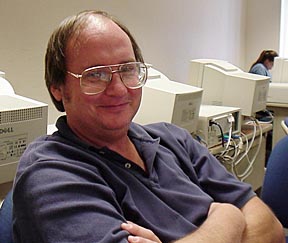Glad to be able to Give Something Back
Interview with IdeaConnection problem solver James Threadgill By Paul Arnold
With up to 77 million people in Bangladesh exposed to toxic levels of arsenic in their drinking water, innovative and affordable solutions to prevent and alleviate suffering are needed, and they are needed now. IdeaConnection’s problems solvers have been giving their time for free to create breakthrough concepts that are set to improve the outlook for millions of people in the South Asia country. They will be developed by Chemists Without Borders (CWB), a non-governmental organisation that solves humanitarian problems through chemistry.
Polymer chemist James Threadgill has worked on nearly two dozen challenges for pay, but this is the first time he has been involved in a common good challenge. His team came up with a number of successful solutions for a cheap way of testing drinking water for the presence of arsenic. In this interview he talks about his contribution to creating life-saving solutions and his motivation for getting involved with the challenge.
 I thought it was an interesting challenge because there are many chemical companies out there and if they had been able to come up with something cheaper they would've done it by now. I was really motivated to come up with something simply because I've seen pictures of Bangladesh and I went to school with some people from there. I know how much the country needs something like this. However, I hadn't heard about the specific problem of arsenic poisoning until the challenge.
I thought it was an interesting challenge because there are many chemical companies out there and if they had been able to come up with something cheaper they would've done it by now. I was really motivated to come up with something simply because I've seen pictures of Bangladesh and I went to school with some people from there. I know how much the country needs something like this. However, I hadn't heard about the specific problem of arsenic poisoning until the challenge. How did you arrive at the solution?
I had an idea that it (arsenic test that costs less than a penny) would be something microbiological, because that would be the only way we could get the cost down. I did a computer search and discovered there had been some papers in the US about bacteria that were immune to arsenic in pesticides in the water here. Those scientists were looking at it from a completely different point of view, but I saw this as an opportunity that we could use the bacteria to make a very simple qualitative test to detect arsenic.
Did the solution come quickly to you?
Well, yes. Once I found out there was a bacterial strain that is immune to arsenic and it can grow in an arsenic environment, then it became a relatively easy task.
How did you apply this knowledge to develop a solution?
It's really quite simple. You take one colony of bacteria that’s immune to arsenic and regular E.coli K12 that is not immune to the chemical element. You expose them to the water and by one dying off and by one surviving you know you have the presence of arsenic. It's quite inexpensive because you can easily grow massive amounts of this stuff, for very little cost.
You can grow the bacteria on ceramics that you have indigenously, and then you put water on them, do the test and when it’s over, put the ceramics in a fire to destroy the test. You are dealing with minimal equipment because it's basically a plus or minus test. It's a good qualitative test that's affordable and easy to perform.
And the results of the test come through pretty quickly?
It should happen relatively quickly because the colonies in the negative control should start to die off pretty soon once they absorb the arsenic into their cytoplasm.
Is this where your involvement in the challenge ends?
At this point I don't want to get involved anymore unless CWB want to ask me further questions. I'll charge them no money and give them whatever technical expertise I can give them. What I'm hoping is that we can keep to the original idea and not complicate it, because obviously we can make the test more expensive, make a quantitative test out of it, but the thing is, that is not really what they asked for. So I'm hoping that we can keep it as something simple that will meet their needs and if CWB want a quantitative test perhaps they can issue another challenge and we can give them a solution for that.
Can the solution you’ve come up with be applied to any situation you've read about in Bangladesh?
As far as I understand, yes. They were just looking for a test to detect the presence of arsenic in their water supply so for that purpose it should work.
Tell me a little about working with the other solvers in your challenge team.
It's always good to work with a team, and we had some very talented people. The only thing, and this sometimes happens with challenge teams, is that we had so much success that we went on further and further with more ideas, and that was good. There's been some really good things come out of it.
Would you like to work on more common good challenges?
Oh absolutely. It's really rewarding and I really enjoy it. It's good to give back. It seems there are lots of places in the world where science has fallen through the cracks and it's not really helped because of the expense. But if you can come up with something that might conceivably work, then why not. It's a great idea.
